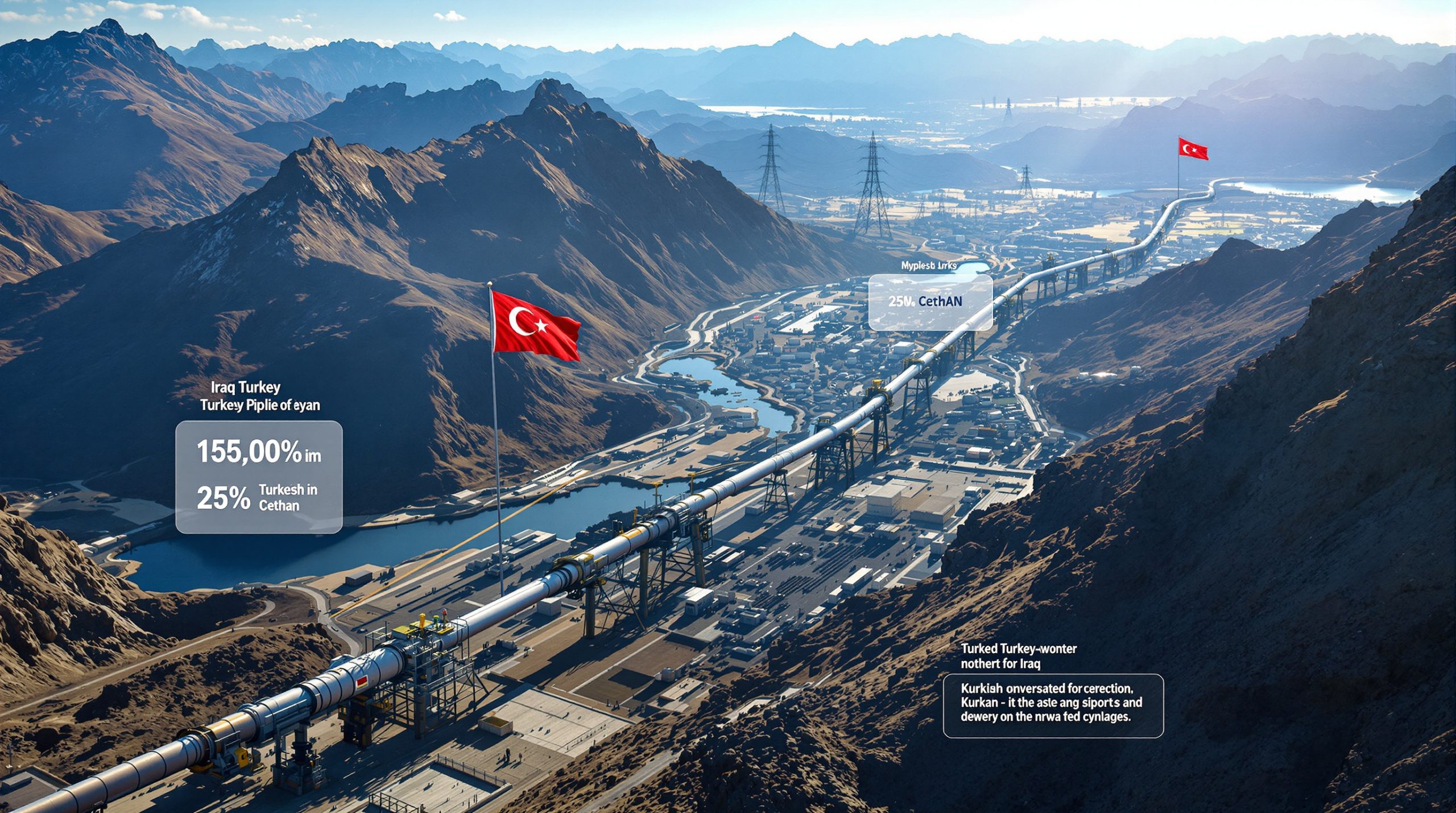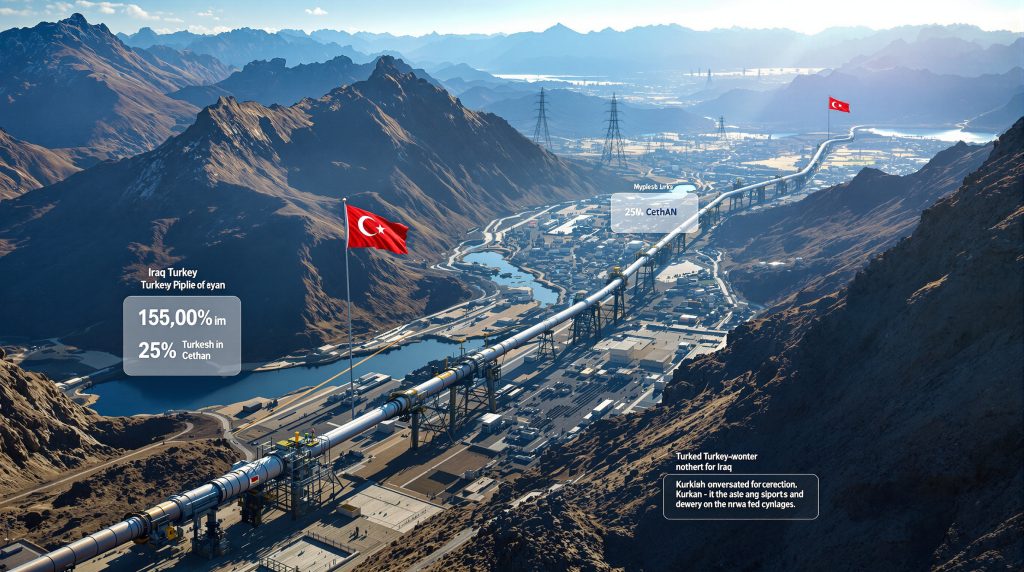Turkey Tightens Grip on Iraq's Energy Lifelines Turkey has established significant control over Iraq's energy infrastructure through two critical channels: oil transportation and electricity supply. This strategic positioning gives Ankara substantial leverage in regional energy politics and economic negotiations with Baghdad and the Kurdistan Regional Government (KRG). Through careful management of pipeline operations and electricity exports, Turkey has created a multi-faceted pressure strategy that significantly constrains Iraq's Turkey grip on Iraq's energy lifelines and regional diplomacy. The Kirkuk-Ceyhan Pipeline Shutdown The Iraq-Turkey Pipeline (ITP), also known as the Kirkuk-Ceyhan pipeline, has been offline since March 2023 following an international arbitration ruling against Turkey. This 960-kilometer pipeline, with a theoretical capacity of 1.6 million barrels per day (bpd), has historically been Iraq's northern export lifeline to global markets. The pipeline consists of two parallel lines with strategic pumping stations positioned at intervals along the route, according to Iraq National Oil Company technical specifications. This infrastructure represents a critical component of Iraq's ability to monetize its northern oil reserves. Key Timeline of Pipeline Developments March 2023: Pipeline operations halted following Paris arbitration ruling July 2025: Turkey announced termination of the 52-year-old Iraq-Turkey Crude Oil Pipeline Agreement July 2026: Scheduled end date for the current pipeline agreement The shutdown has particularly affected the Kurdistan Regional Government, which relied heavily on independent oil exports through this route to maintain financial autonomy from Baghdad. The export volume impact has been severe, with approximately 400,000-500,000 barrels per day of Kurdish oil exports eliminated, according to 2024 data from the Kurdistan Regional Government Ministry of Natural Resources. What Legal Disputes Underpin Turkey's Energy Control? The legal framework governing Iraq-Turkey energy relations has become increasingly complex, with multiple disputes creating leverage points for Ankara in negotiations. The $1.5 Billion Arbitration Award The International Chamber of Commerce (ICC) in Paris ruled that Turkey violated its agreements with Iraq by allowing the KRG to export oil independently through the pipeline between 2014 and 2018 without Baghdad's consent. The ruling (ICC Case No. 21903/ZF/AYZ, March 2023) covered unauthorized KRG exports totaling an estimated 300 million barrels during this period. Energy law specialists note that this decision establishes an important precedent for sovereign control over pipeline transit agreements in international arbitration. Financial and Legal Implications Turkey was ordered to pay approximately $1.5 billion in compensation to Iraq The ruling has become a key bargaining chip in negotiations Turkey has used the pipeline shutdown as leverage to force settlement terms Legal experts emphasize that Turkey's termination of the 52-year agreement creates significant uncertainty for future energy transit frameworks between the two countries. Contractual Restructuring Demands Turkey has signaled that any pipeline restart requires: Settlement of the arbitration award New legal frameworks to prevent future claims Higher and more consistent throughput guarantees Expanded Turkish participation in Iraqi energy projects These demands reflect Turkey's broader strategy to deepen its involvement in Iraq's energy sector while securing legal protections against future disputes. How Is Turkey Using Electricity Exports as Leverage? Turkey's control over Iraq's energy infrastructure extends beyond oil transportation to include electricity supply, creating another point of leverage in negotiations. The Northern Iraq Power Dependency Turkey recently halted 600 MW of electricity exports to northern Iraq, citing payment arrears from Baghdad. This cutoff has severely impacted provinces like Nineveh and Mosul during peak summer demand. The 600 MW reduction represents approximately 15% of northern Iraq's total electricity supply during peak demand periods, according to the Iraqi Ministry of Electricity (August 2024). Iraqi payment arrears to Turkey for electricity have reached an estimated $1.2 billion as of September 2024, according to the Turkish Energy Market Regulatory Authority. Impact of Electricity Suspension Nineveh and Mosul experienced rolling blackouts of 6-8 hours daily Industrial facilities in Erbil reduced operations by 30% due to power shortages Worsened electricity shortages during high-demand summer months when consumption reaches 4,000 MW Created additional pressure on Baghdad to address multiple energy disputes simultaneously Turkish power supplies feed directly into Iraq's northern grid through high-voltage transmission lines at the border, established under the Iraq-Turkey Electrical Interconnection Agreement of 2010. The Multi-Faceted Pressure Strategy Turkey appears to be coordinating pressure across multiple fronts: Oil transit through the Kirkuk-Ceyhan pipeline Electricity exports to northern provinces Water management of the Tigris and Euphrates rivers Access to Iraqi energy development projects By controlling these essential resources simultaneously, Turkey has created a comprehensive leverage package that significantly constrains Iraq's options for energy independence and regional policy. What Are the Implications for Kurdistan's Autonomy? The KRG's position has been particularly affected by Turkey's energy control strategy, with significant implications for Kurdish autonomy. Financial Constraints Without Pipeline Access The KRG's financial independence has been severely limited by the pipeline shutdown. Without direct oil exports, the Kurdish region has become more dependent on budget transfers from Baghdad. The KRG's oil revenue dropped from $400 million monthly to approximately $50 million following the pipeline closure, according to 2024 data from the KRG Ministry of Natural Resources. As a result, Kurdistan now receives 80% of its budget from Baghdad transfers versus 40% pre-2023, according to the KRG Ministry of Finance. The KRG's Weakened Position Kurdish oil production capacity remains at 450,000 bpd but only 150,000 bpd reaches export markets Trucking operations can handle maximum 30,000 bpd at costs 3-4 times higher than pipeline transport Kurdish oil storage facilities can hold maximum 10 days of production Limited ability to negotiate independently with international oil companies Constrained political leverage in broader Iraqi politics Triangular Negotiations The situation has created a complex three-way negotiation between Ankara, Baghdad, and Erbil, with the KRG often caught in the middle with diminishing leverage. This dynamic fundamentally changes the balance of power in regional energy politics. Why Haven't Pipeline Exports Resumed Despite Announcements? Despite numerous announcements about agreements to restart exports, the pipeline remains offline due to unresolved technical, legal, and financial issues. The Gap Between Statements and Implementation Baghdad and Erbil have issued 12 joint statements about pipeline restart since March 2023, according to media monitoring analysis. However, actual oil flows have not materialized. Pipeline integrity assessments indicate a need for $200-300 million in maintenance after the extended shutdown, according to pipeline engineering consultancy reports from 2024. Additionally, international oil companies require $2 billion in insurance coverage that remains unavailable, based on London insurance market assessments. Barriers to Pipeline Restart Turkey's insistence on comprehensive settlement of all disputes Lack of legal protections against future claims Uncertainty about pipeline integrity after extended shutdown International oil companies' hesitation without firm guarantees Pipeline engineers emphasize that extended shutdowns create corrosion and mechanical integrity risks that must be addressed before operations can safely resume. Operator Concerns and Guarantees Oil companies operating in Iraq and Kurdistan require specific assurances before committing volumes to the pipeline: Clear marketing arrangements through SOMO (Iraq's State Organization for Marketing of Oil) Transparent payment mechanisms Contract protection Security guarantees Technical verification of pipeline integrity Without these guarantees, operators remain reluctant to commit their production to the pipeline, further delaying the restart of exports. What Is Turkey's Broader Regional Strategy? Turkey's energy leverage over Iraq fits into a larger strategy of regional influence and economic integration. Recent oil price rally analysis suggests this strategy could have significant impacts on regional markets. The Comprehensive Energy Package Approach Turkey is pursuing a holistic approach that links crude oil transit with: Electricity sales Natural gas development Participation in Iraqi energy infrastructure projects Regional trade corridor development Turkey earns approximately $300 million annually from Iraqi oil transit fees, according to the Turkish Petroleum Pipeline Corporation (2023). The broader Turkey-Iraq bilateral trade reached $21 billion in 2023, with energy comprising 60% of this total, based on Turkish Statistical Institute data. Turkey's Strategic Objectives Secure long-term influence over Iraqi energy exports Establish itself as an indispensable energy hub Gain access to Iraqi domestic energy development projects Create economic dependencies that translate to political leverage Turkey has committed $5 billion to Iraqi energy infrastructure projects since 2020, according to the Turkish Ministry of Energy. This includes agreements for natural gas exploration in northern Iraq worth $2.8 billion and the development of a 150,000 bpd refinery in Kurdistan. Proposed New Energy Framework While terminating the existing pipeline agreement, Turkey has simultaneously proposed a new, expanded energy cooperation framework with Iraq that would include: Natural gas development Petrochemical projects Electricity infrastructure Trade corridor integration linking the Gulf to Europe This comprehensive approach aims to deepen Turkey's role in Iraq's energy sector while addressing Ankara's concerns about legal liability and throughput commitments. How Does This Affect Iraq's Energy Independence? Turkey's control over critical energy infrastructure significantly limits Iraq's options for energy independence and export diversification. These constraints have serious implications for energy transition insights in the region. Limited Alternative Export Routes Iraq's northern oil fields and Kurdistan's production have few viable alternative export options: Trucking oil is expensive and limited in volume Building new pipeline routes would require years and billions in investment Political obstacles exist for potential routes through Iran or Syria Northern Iraq has no viable alternative export routes handling more than 50,000 bpd, according to Iraq Oil Marketing Company analysis (2024). As a result, Iraq loses approximately $1.2 billion monthly from reduced northern exports, based on Iraqi Ministry of Finance calculations. Iraq's Constrained Options Alternative routes through Iran face U.S. sanctions risks; Syrian routes lack security Iraq's southern ports operate at 95% capacity, limiting expansion for northern crude New pipeline routes would require 5-7 years and $8-12 billion investment, according to international pipeline feasibility studies These geographic and infrastructure constraints leave Iraq with few practical alternatives to the Turkey route for northern exports. Electricity Supply Vulnerabilities Iraq's domestic electricity generation remains insufficient to meet demand, particularly in northern regions, creating another point of leverage for Turkey. This dependency on imported electricity further complicates Iraq's negotiating position, especially given current natural gas price forecast trends. What Are the Regional Power Dynamics at Play? Turkey's energy leverage over Iraq exists within a broader context of shifting regional influence and power dynamics. Shifting Regional Influence Turkey's control over Iraq's energy infrastructure comes amid broader regional realignments: Reduced U.S. presence in Iraq Fluctuating Iranian influence Growing Turkish economic and political engagement Turkey's economic presence in northern Iraq has grown 40% since 2020, according to the Turkey-Iraq Business Council (2024). In addition to economic ties, Turkey maintains approximately 5,000 troops in northern Iraq for counter-terrorism operations, as reported by the International Crisis Group. Strategic Implications Turkish companies operate 1,500 businesses in Kurdistan Region Turkey has built 3 new border crossings with Iraq since 2020 Turkey positioning itself as the dominant regional power in northern Iraq Increased economic integration between Turkey and Iraq Potential for Turkey to mediate between Baghdad and Erbil Water Resources as Additional Leverage Turkey controls 88% of Euphrates water flow and 51% of Tigris flow entering Iraq, according to the UN Water Resources Assessment (2023). This control of headwaters provides additional leverage through dam projects that affect water flow to Iraq, creating a multi-dimensional dependency relationship. What Are the Prospects for Resolution? Despite the current impasse, there are potential pathways to resolving the energy standoff between Turkey, Iraq, and the KRG. Any resolution will likely need to consider the global trade impact of new energy agreements. Potential Pathways Forward Direct talks between Turkey, Iraq, and KRG have occurred monthly since May 2024, according to the Iraqi Prime Minister's office. Combined daily losses from the pipeline closure exceed $50 million for all parties, creating economic incentives for resolution, according to energy consulting firm analysis. Draft agreements have reportedly addressed 70% of outstanding issues, according to Iraq-Turkey diplomatic sources as of September 2024. Proposed settlement mechanisms include escrow accounts that would handle arbitration payments over a 5-year period, while Turkey seeks minimum 500,000 bpd throughput guarantees for 10 years. Negotiation Challenges Multiple interconnected issues requiring simultaneous resolution Complex three-way negotiations between Ankara, Baghdad, and Erbil International oil company requirements for legal certainty Technical challenges after prolonged pipeline shutdown Economic Imperatives The economic costs of continued pipeline shutdown are substantial for all parties: Iraq loses export revenue and production capacity Kurdistan faces ongoing financial constraints Turkey forgoes transit fees and regional influence International oil companies see reduced returns on investments These shared economic interests may eventually push all parties toward a compromise solution, despite the current leverage imbalance. Additionally, upcoming OPEC oil production impact decisions could further influence negotiations. Turkey's Consolidated Energy Leverage Turkey has effectively consolidated control over Iraq's northern energy lifelines through a combination of pipeline management, electricity exports, and legal maneuvering. This strategic positioning gives Ankara significant leverage in regional energy politics and economic negotiations. The ongoing impasse highlights the interconnected nature of regional energy infrastructure and the power dynamics that shape energy flows. For Iraq and the KRG, resolving these issues is critical to energy security and economic stability, but doing so requires navigating Turkey's comprehensive leverage strategy. As negotiations continue, the outcome will significantly impact not only energy flows but also political relationships and economic development throughout the region. Turkey's position as gatekeeper to international markets for Iraqi energy resources remains a defining feature of regional geopolitics. Understanding this complex dynamic is essential for anyone seeking to grasp the broader implications of energy infrastructure control in shaping political and economic relationships in the Middle East. Looking for the Next Major Mineral Discovery? Stay ahead of the market with Discovery Alert's proprietary Discovery IQ model, which delivers instant notifications on significant ASX mineral discoveries and transforms complex data into actionable insights. Explore how historic discoveries have generated substantial returns by visiting the Discovery Alert discoveries page and begin your 30-day free trial today.

Turkey’s Strategic Grip on Iraq’s Energy Lifelines
Discover how Turkey strategically controls Iraq’s oil exports and electricity



